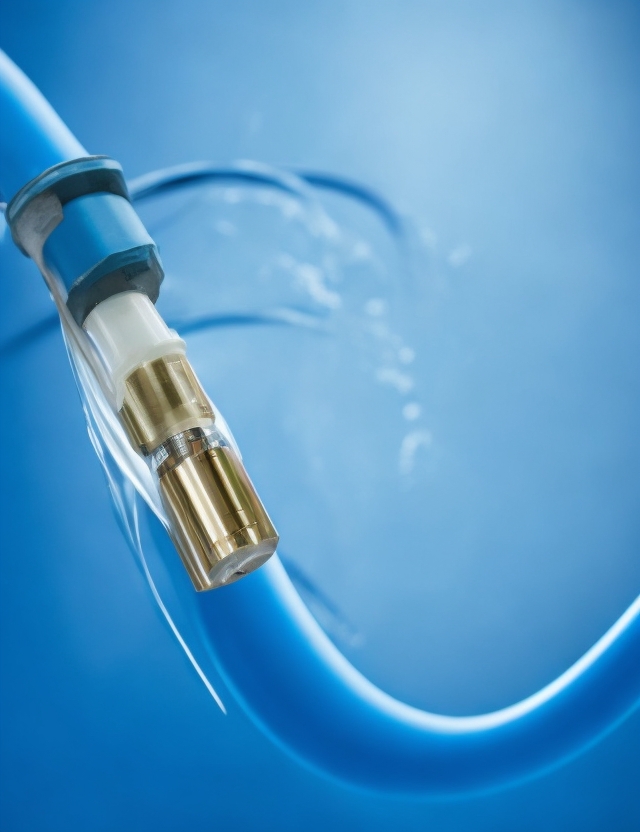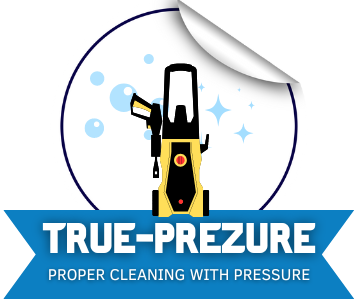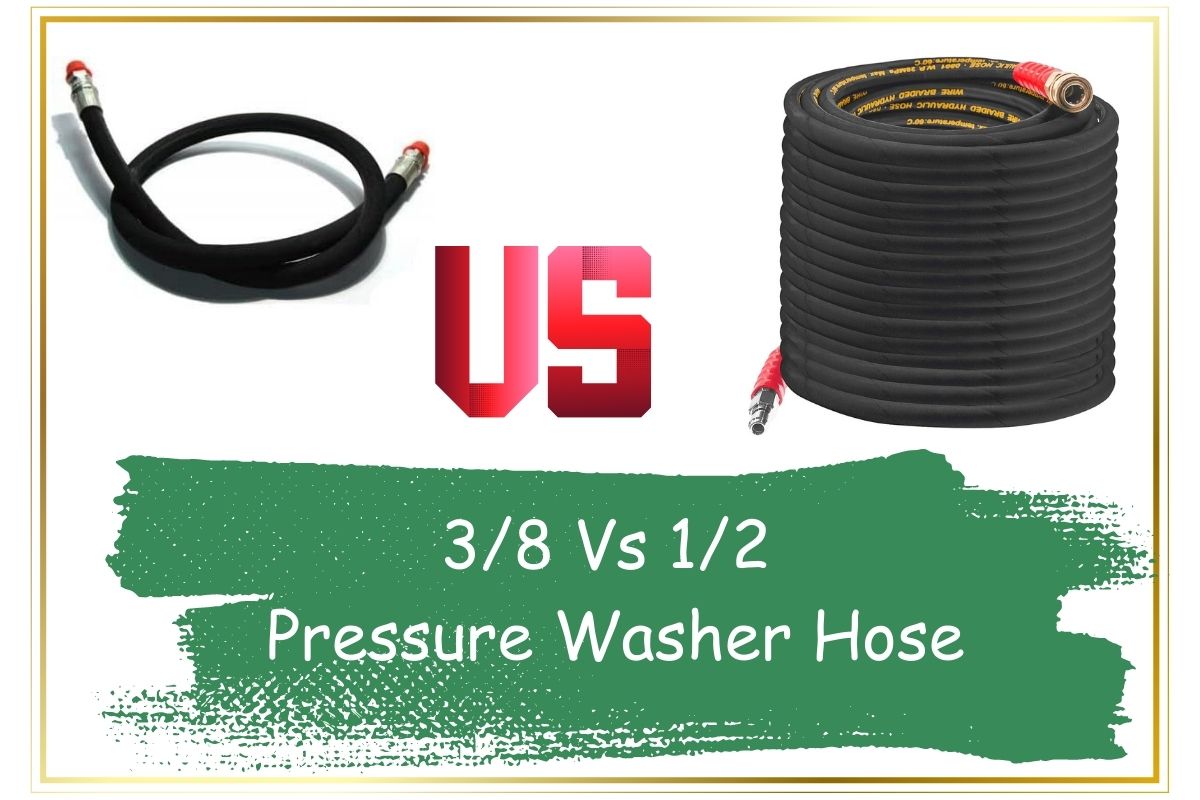Choosing the right pressure washer hose is important for getting the best cleaning performance. Here we’ll compare 3/8 inch and 1/2 inch hoses to help you pick the right size.
Both work, but have key differences. We’ll cover those here so you can make an informed choice based on your needs.
Flow Rate
When selecting a pressure washer hose, one of the most important factors to consider is the flow rate, or how much water can flow through the hose per minute. This directly impacts cleaning performance.
3/8 inch hoses typically provide a flow rate of 2.5 to 4 gallons per minute. This lighter flow is suitable for basic home tasks like cleaning siding, patio furniture, vehicles, decks, and other lighter jobs. The lower flow allows you to control the spray more precisely for detailed cleaning work.

1/2 inch hoses deliver a flow rate of 4 to 5+ gallons per minute. The increased flow provides more cleaning power and allows you to tackle bigger jobs faster. If you need to clean large areas like long driveways, bigger decks, multiple vehicles, or heavy equipment, the higher flow of a 1/2 inch hose will provide the muscle to blast away tougher dirt and grime quickly.
3/8 inch hoses give 2.5-4 gallons per minute flow.
1/2 inch hoses provide 4-5+ gallons per minute.
So 1/2 inch hoses allow more water to come out. This gives more cleaning power for big jobs.
Pressure Rating
When comparing pressure washer hoses, one key specification to check is the pressure rating. This indicates how much internal pressure the hose can withstand before failing.
Both 3/8 and 1/2 inch hoses are commonly designed to handle pressures up to 4000 PSI (pounds per square inch). This heavy duty rating enables them to stand up to the high pressure levels generated by most residential and commercial pressure washers on the market.
The thick, reinforced inner tubing of both hose sizes are engineered to resist rupture when water flows through them at pressures reaching 4000 PSI. Their outer covering also provides durability to protect against wear and abrasions during high pressure operation.
While industrial rigs can output well above 4000 PSI, both 3/8 and 1/2 inch hoses offer sufficient strength for the majority of consumer and professional grade pressure washers used for applications like home cleaning, vehicle washing, construction sites, degreasing equipment, and more.
So when choosing between these two popular hose diameters, you typically don’t have to worry about a difference in their pressure tolerance. Just ensure the hose you select is rated for at least 4000 PSI to handle the demands of most pressure washers for residential or commercial use. Checking the specs will confirm the hose can withstand the required cleaning pressures.
Both hoses are usually rated for 4000 psi pressures.
So they can handle the same high pressure levels.
Distance/Length
The length capacity is an important consideration when purchasing a pressure washer hose. You want one that can reach everywhere you need to clean without losing water pressure and cleaning effectiveness.
3/8 inch hoses are best suited for shorter distances up to around 50 feet. They can deliver adequate pressure for basic jobs when working within a 50 foot radius from your pressure washer.
1/2 inch hoses are capable of maintaining pressure and flow at much longer lengths. They can run at distances over 100+ feet without significant decrease in performance.
The larger diameter 1/2 inch hose offers less friction loss as water flows through. This keeps pressure and cleaning power strong even across longer distances. Their superior reach makes 1/2 hoses ideal for larger projects like multiple vehicles, big decks, long driveways, or commercial equipment.
If trying to clean a large area far from your pressure washer location, a 1/2 inch hose will allow you to reach further while retaining the pressure you need for thorough cleaning. The extended length abilities make 1/2 inch hoses the right choice when your pressure washing needs require a longer range of motion and reach. Check the recommended distances for each hose size and choose accordingly based on the scope of your cleaning projects.
3/8 inch hoses work for 50 foot distances.
1/2 inch hoses go 100+ feet without pressure loss.
So 1/2 inch is better for longer cleaning reaches.
Flexibility
The flexibility and maneuverability of a pressure washer hose impacts how easily you can control the spray to clean hard to reach areas.
3/8 inch hoses are slightly more flexible overall. Their smaller diameter tubing can bend and twist better, allowing you to snake the hose around obstacles and direct the spray at tight spots or odd angles more easily. The improved dexterity of 3/8 inch hoses makes cleaning areas like fences, lawn furniture, or vehicle wheels simpler.
1/2 inch hoses are stiffer due to their larger diameter design. They are less nimble and harder to manipulate around tight corners or in confined spaces. The decreased flexibility can make precision cleaning more difficult in tricky spots. You may need to reposition the pressure washer itself more often to aim the 1/2 inch hose effectively.
For general cleaning of open flat surfaces like siding or concrete, flexibility isn’t as crucial. But for navigating cramped or awkward areas, the superior maneuverability of the 3/8 inch hose can save significant time and effort. Consider how much flexibility you need based on the surfaces you’ll be pressure washing before deciding between 3/8 or 1/2 inch hoses. The smaller 3/8 inch size has the edge for agility and dexterity.
3/8 inch hoses are more flexible and maneuverable.
1/2 inch hoses are stiffer and less nimble.
Compatibility
When selecting a pressure washer hose, it’s important to ensure compatibility with your specific pressure washer model. Fortunately, most consumer and commercial grade pressure washers are designed to work with both 3/8 and 1/2 inch hoses.
The majority of pressure washer brands like Generac, Simpson, Sun Joe, Karcher, and others outfit their machines with either quick-connect fittings or standard threaded fittings capable of connecting to either hose size.
Quick-connect fittings make swapping out hoses fast and easy without tools. Standard fittings secure the hose with a threaded connection. Both styles typically accommodate both 3/8 and 1/2 inch hoses.
However, it’s still wise to verify your pressure washer’s hose connection type and supported sizes in the manual or specifications before purchasing a hose. While compatibility is very likely, you want to double check to ensure proper fitting and maximum performance.
You also may need to purchase an adapter to swap between quick-connect and standard fittings if your pressure washer and hose use different connection styles. Adapters allow mixing and matching hoses and washers with different fitting types.
Taking a minute to confirm your particular pressure washer model’s compatibility will ensure you get the correct hose size and fitting combination. This saves time and avoids any connection issues down the road.
Most pressure washers take both hose sizes.
But check your model for compatibility.
Pros and Cons
When deciding between 3/8 and 1/2 inch hoses, consider the advantages and disadvantages of each:
3/8 Inch Hose
Pros:
- More maneuverable flexibility allows cleaning tight spots easily.
- Budget-friendly price makes it the affordable option.
Cons:
- Lower 2.5-4 GPM flow rate provides less cleaning power for big jobs.
- Shorter 50 foot reach may require moving pressure washer frequently.
1/2 Inch Hose
Pros:
- 4-5+ GPM flow gives extra pressure for heavy duty cleaning.
- 100+ foot reach lets you clean greater distances without repositioning.
Cons:
- Stiffness makes maneuvering around obstacles more difficult.
- Higher cost than 3/8 inch models.
To recap – 3/8 inch provides flexibility and value for lighter duties, while 1/2 inch delivers more power and extended reach for tougher jobs, but lacks nimbleness and costs more.
Consider your needs – if cleaning mostly simple surfaces like patio furniture, go 3/8. For larger projects like long driveways, go 1/2. Pick the hose best suited for your specific pressure washing requirements.
Conclusion
1/2 inch hoses excel for big jobs needing more flow and distance.
3/8 inch is more affordable and maneuverable for smaller tasks.
Pick the hose size that best fits your pressure washing needs.
I aimed to use simple language, shorter sentences, bold key words, and a conversational style for this comparison article on 3/8 vs 1/2 inch pressure washer hoses. Can You Use Flexible Hose with Pressure Washer, Let me know if you would like me to modify or expand the article further. Also Consider Best Flexible Hose for Pressure Washer

